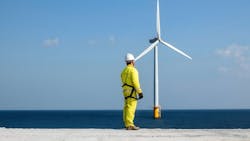Germany receives no bids in zero-subsidy offshore wind auction
Germany’s latest offshore wind auction failed to attract a single bid on August 6th, alarming the local offshore wind sector, which is calling for a fundamental revamp of Germany’s renewable energy auctions.
This was Germany’s second offshore wind auction round so far this year. Both have been “no subsidy” auctions, and both have been unsuccessful. In this case, not a single offshore wind developer bid for either of the two sites N-10.1 and N-10.2 in the German North Sea.
The auction, described as a “flop” by analysts, signaled that offshore wind power developers are wary of taking on riskier, zero-subsidy projects amid rising costs and supply chain issues.
The German Offshore Wind Energy Association (BWO) viewed this result as an “an alarming signal,” and called upon the German government to fundamentally reform the auction design.
“The current auction design forces developers to bear risks beyond their control without any protection,” said BWO’s managing director Stefan Thimm.
“The result sends a clear message: The German offshore wind market is currently not attractive to investors. The federal government is thus missing the opportunity for significant value creation and employment in Germany and Europe,” Thimm added.
Germany urgently needs to revamp the auction design and help eliminate bottlenecks in the supply chain, such as barriers to port expansions and modernization, the executive noted.
“The federal government must finally pave the way for a reliable CfD [contract for difference] system alongside long-term electricity supply contracts. Contracts for Difference lead to a reduction in electricity generation costs of up to 30 percent – the basis for competitive electricity prices,” Thimm said. “Without this reform, further auctions could fail – and with them the energy transition.”
A “contract for differences” in the energy sector is a financial agreement between a generator and a counterparty, often a government, that guarantees a fixed price for electricity over a set period, regardless of fluctuating market prices. This mechanism helps manage risk and incentivizes investment in clean energy projects by providing price certainty.
The failed auction is the latest setback in Europe for offshore wind, which has seen its growth prospects reduced by rising costs in recent years. As developers prioritize profitability over growth, governments increasingly need to provide subsidies to stimulate investment, some analysts and officials contend.
That represents a reversal from recent years, when offshore wind farm developers in the North Sea were ready to invest without government backing, including in Germany. Two years ago, bp Plc and TotalEnergies SE agreed to pay billions of euros for the right to develop major projects.
But today, bp is pulling back from renewable power as it focuses on the profit-driving fossil fuel business, while Total is undertaking a strategic review of its offshore wind business in Germany. An earlier offshore auction in June already saw a drop in bidders.
Federal Minister for Economic Affairs and Energy Katherina Reiche has said that it would be “beneficial” for regulators to look at adjusting the tender. The areas will be re-tendered next year.
Want more offshore wind content?
The monthly Renewable Energy newsletter provides updates on new technology, projects and policy for the development of offshore renewable energy from wind, waves, solar and other resources.
Subscribe for free today.
About the Author
Bruce Beaubouef
Managing Editor
Bruce Beaubouef is Managing Editor for Offshore magazine. In that capacity, he plans and oversees content for the magazine; writes features on technologies and trends for the magazine; writes news updates for the website; creates and moderates topical webinars; and creates videos that focus on offshore oil and gas and renewable energies. Beaubouef has been in the oil and gas trade media for 25 years, starting out as Editor of Hart’s Pipeline Digest in 1998. From there, he went on to serve as Associate Editor for Pipe Line and Gas Industry for Gulf Publishing for four years before rejoining Hart Publications as Editor of PipeLine and Gas Technology in 2003. He joined Offshore magazine as Managing Editor in 2010, at that time owned by PennWell Corp. Beaubouef earned his Ph.D. at the University of Houston in 1997, and his dissertation was published in book form by Texas A&M University Press in September 2007 as The Strategic Petroleum Reserve: U.S. Energy Security and Oil Politics, 1975-2005.

